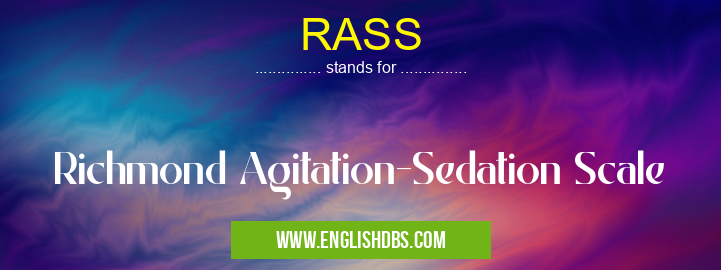What does RASS mean in CLINICAL MEDICINE
RASS stands for Richmond Agitation-Sedation Scale. It is a widely used tool to assess the level of agitation or sedation in patients who are critically ill or receiving mechanical ventilation. Developed in 2002 at the Medical College of Virginia, the RASS is a 10-point scale that ranges from -5 to +4.

RASS meaning in Clinical Medicine in Medical
RASS mostly used in an acronym Clinical Medicine in Category Medical that means Richmond Agitation-Sedation Scale
Shorthand: RASS,
Full Form: Richmond Agitation-Sedation Scale
For more information of "Richmond Agitation-Sedation Scale", see the section below.
Understanding the RASS Scale
The RASS scale provides a standardized method for healthcare professionals to evaluate and communicate the patient's behavioral state:
- -5: Unresponsive
- -4: Responds only to painful stimuli
- -3: Responds only to verbal stimuli
- -2: Responds only to tactile stimuli
- -1: Lethargic, slow to respond
- 0: Alert, quiet, and cooperative
- +1: Restless, but cooperative
- +2: Agitated, frequently non-cooperative
- +3: Very agitated, pulling at tubes or lines
- +4: Combative
Applications of RASS
The RASS scale has numerous applications in clinical settings, including:
- Monitoring sedation levels during mechanical ventilation
- Assessing the effectiveness of sedatives and analgesics
- Identifying patients at risk for delirium and other complications
- Guiding treatment decisions for agitation or sedation
- Improving communication between healthcare professionals
Essential Questions and Answers on Richmond Agitation-Sedation Scale in "MEDICAL»CLINICAL"
What is the Richmond Agitation-Sedation Scale (RASS)?
The RASS is a tool used to assess the level of agitation or sedation in patients, particularly in intensive care units. It is a 10-point scale, with scores ranging from -5 (unarousable) to +4 (combative). The RASS is used to assess the patient's level of consciousness, responsiveness to verbal and physical stimuli, and any signs of agitation or sedation.
How is the RASS used?
The RASS is typically used by healthcare professionals, such as nurses and doctors, to assess the level of agitation or sedation in patients. It can be used to monitor the effects of sedative medications, assess the patient's response to pain, or to determine the need for further medical intervention.
What are the benefits of using the RASS?
The RASS provides a standardized and objective way to assess the level of agitation or sedation in patients. It allows healthcare professionals to accurately monitor the patient's condition and make appropriate treatment decisions. The RASS can also be used to communicate the patient's condition to other healthcare providers.
Are there any limitations to using the RASS?
The RASS may not be as accurate in patients who are intubated or have other conditions that affect their ability to communicate. Additionally, the RASS may not be sensitive enough to detect subtle changes in the patient's condition.
What are some examples of RASS scores?
A RASS score of -1 indicates that the patient is awake and alert, but drowsy. A RASS score of +2 indicates that the patient is agitated and restless. A RASS score of -5 indicates that the patient is unarousable.
Final Words: The Richmond Agitation-Sedation Scale (RASS) is an essential tool for healthcare professionals caring for critically ill patients. It provides a reliable and objective measure of agitation and sedation, enabling clinicians to make informed decisions about patient management and improve outcomes.
